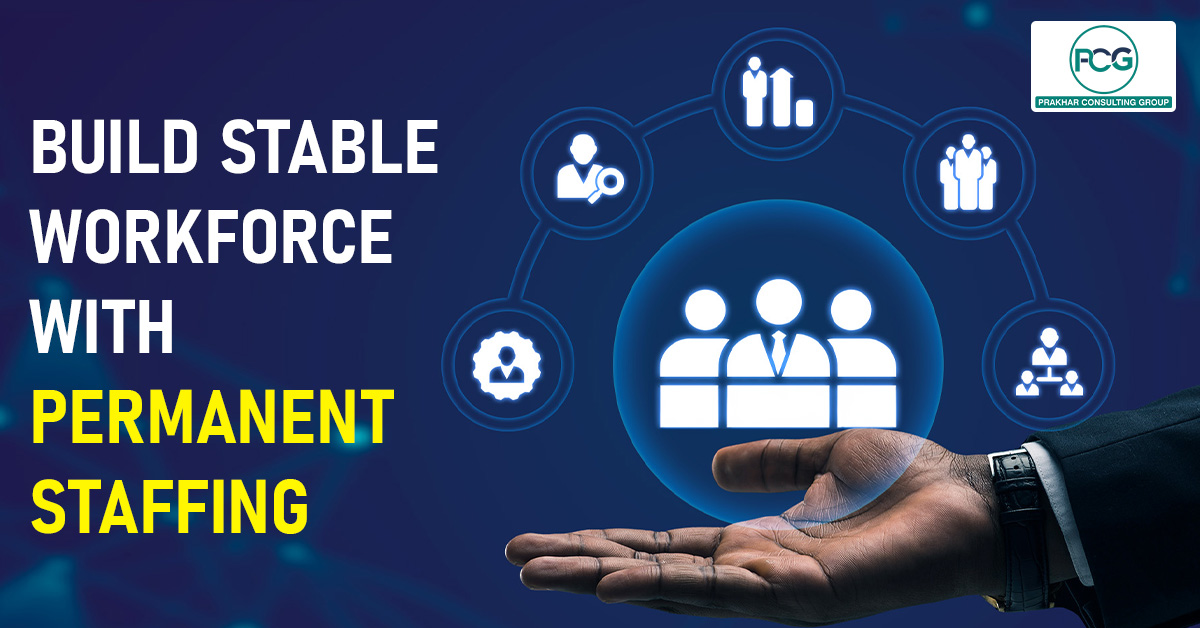Permanent Staffing Companies: Key to Building a Stable Workforce
Author: Mayank Puri

"An organization’s workforce serves as its backbone, fueling every milestone and driving its success forward. In the highly competitive business landscape today, companies are placing greater emphasis on cultivating a stable and dependable workforce to ensure sustainable growth and efficiency." While temporary hires may address immediate needs, their benefits often pale in comparison to the long-term value that permanent employees bring to an organization. This is where Permanent Staffing Companies play a pivotal role, offering tailored staffing solutions to help businesses build a strong foundation for sustained stability and growth.
How Permanent Staffing Services Shape Modern Businesses?
Permanent staffing involves hiring employees for long-term roles, integrating them as vital contributors to the organisation. Permanent Staffing Services play a crucial role in identifying and onboarding such employees, ensuring they align with the company’s culture and objectives. These employees are more than just resources—they are partners in growth, sharing the company’s vision and goals. Unlike temporary staff, permanent employees exhibit higher levels of engagement, loyalty, and performance, fostering a stable and productive environment.
Why Permanent Staffing is Crucial for Organizations?
The decision to prioritize permanent staffing is often rooted in its numerous advantages, which go beyond operational efficiency. Here’s why permanent staffing is a strategic necessity for businesses:
1. Enhanced Employee Loyalty
Permanent employees are more likely to align with the company’s vision and values. Their long-term commitment contributes to organizational continuity and fosters trust among team members.
2. Cost Efficiency
While the initial costs associated with permanent hires may be higher, businesses save significantly in the long run by reducing frequent recruitment, training, and onboarding expenses. The financial stability derived from a dedicated workforce outweighs the recurring costs of temporary staffing.
3. Consistency in Quality
Permanent staff are better equipped to deliver consistent results, which is critical for maintaining quality standards across projects. Their in-depth understanding of company processes ensures higher levels of accountability and performance.
4. Cultural Integration
Permanent employees play a significant role in shaping and maintaining a cohesive organizational culture. Their long-term presence helps establish shared values and promotes collaboration within teams.
5. Compliance and Stability
Permanent staffing reduces the risk of legal complications, as these employees are fully integrated into the organization’s policies and labor laws. This ensures stability in operations and adherence to compliance standards.
Challenges in Permanent Staffing and Solutions?
While the benefits of permanent staffing are evident, the process comes with its own set of challenges. Addressing these effectively can help businesses optimize their staffing strategies.
1. High Initial Recruitment Costs
Recruiting permanent employees requires a significant investment in sourcing, screening, and onboarding.
Solution: Leveraging professional recruitment services or adopting advanced hiring tools can streamline these processes, reducing costs and improving efficiency.
2. Skill Gaps in the Market
Finding the best candidates who possess the right mix of technical and soft skills can be herculean.
Solution: Focus on upskilling programs and partnerships with educational institutions to bridge skill gaps and nurture talent.
3. Retention Challenges
Even permanent employees may leave if they feel undervalued or unsupported.
Solution: Offer competitive compensation, clear career growth opportunities, and robust employee engagement programs to create a positive work environment.
4. Economic Fluctuations
Market downturns can make it challenging to sustain a large permanent workforce.
Solution: Develop flexible workforce strategies that combine permanent and temporary staffing to adapt to market conditions.
Permanent Staffing Best Practices for Workforce Excellence
Implementing Permanent Staffing Best Practices ensures that organizations attract, retain, and develop top talent. Here are some strategies to build a resilient workforce:
1. Comprehensive Job Descriptions
Clearly defined roles and responsibilities help attract the right candidates. Detailed job descriptions reduce mismatched hires, improving compatibility and retention.
2. Leveraging Recruitment Technology
Using tools like applicant tracking systems (ATS) and AI-driven platforms simplifies the hiring process. These technologies enable efficient candidate sourcing, screening, and selection.
3. Focus on Cultural Fit
Ensuring that candidates align with the organization’s culture and values is vital for long-term success. Conducting behavioral interviews and cultural assessments during recruitment can ensure compatibility.
4. Ongoing Training and Development
Investing in employee development fosters loyalty and motivation. Affordable Permanent Staffing Solutions for Startups can complement these efforts by ensuring that businesses bring in talent ready to embrace continuous learning opportunities and contribute effectively to organizational goals."
5. Competitive Compensation
Offering market-aligned salaries and benefits is critical to attracting top talent. Transparent communication about compensation policies enhances trust and satisfaction.
6. Employer Branding
Building a strong employer brand helps position the company as an attractive workplace. Highlighting workplace culture, values, and career growth opportunities attracts high-quality candidates.
Permanent Staffing Solutions for Small Businesses
Small businesses face unique challenges when it comes to workforce management. Limited budgets, high turnover, and lack of HR expertise often hinder growth. Permanent Staffing Solutions for Small Businesses address these issues effectively, providing tailored approaches that enable small enterprises to thrive.
1. Operational Stability
Permanent employees ensure consistency in daily operations, reducing disruptions caused by frequent turnover. This allows business owners to focus on scaling and strategic planning.
2. Cost-Effectiveness
While hiring permanent staff may involve higher upfront costs, it eliminates recurring expenses associated with temporary staffing. This efficiency enables small businesses to allocate resources more strategically.
3. Customer Relationships
Permanent employees often build lasting relationships with clients, enhancing trust and loyalty. This continuity strengthens customer satisfaction and brand reputation.
How Permanent Staffing Drives Organizational Growth?
Permanent staffing goes beyond filling vacancies—it is a cornerstone of sustainable growth. Here’s how it supports organizational success:
1. Drives Innovation
Permanent employees, deeply integrated into the organization’s processes, are better equipped to propose and implement innovative solutions. Their familiarity with company operations enables them to identify inefficiencies and drive improvements.
2. Builds a Loyal Workforce
Job security and growth opportunities foster loyalty among permanent employees. This reduces turnover rates and ensures continuity in business operations.
3. Strengthens Customer Relationships
Long-term employees develop deeper connections with clients, leading to better communication and trust. This consistency enhances customer satisfaction and drives long-term partnerships.
4. Facilitates Strategic Planning
A stable workforce allows organizations to focus on long-term goals rather than constantly addressing staffing challenges. This stability supports strategic initiatives and operational scalability.
The Future of Permanent Staffing
The landscape of permanent staffing is evolving, driven by technological advancements and changing workforce dynamics. While automation and gig roles continue to rise, permanent staffing remains essential for roles that require deep expertise and long-term organizational commitment.
Organizations that prioritize permanent staffing are better positioned to adapt to industry changes, foster innovation, and achieve sustained growth.
Conclusion
Permanent staffing is more than a recruitment strategy—it is an investment in an organization’s future. Top-rated Permanent Staffing Firms play a crucial role in helping businesses implement best practices, address challenges effectively, and foster a culture of growth and inclusivity. By leveraging their expertise, businesses can build a stable and high-performing workforce. Organizations that focus on permanent staffing are not just preparing for today’s needs but are also laying the groundwork for a resilient and thriving future.

